Syria conflict: Civilians under siege
- Published
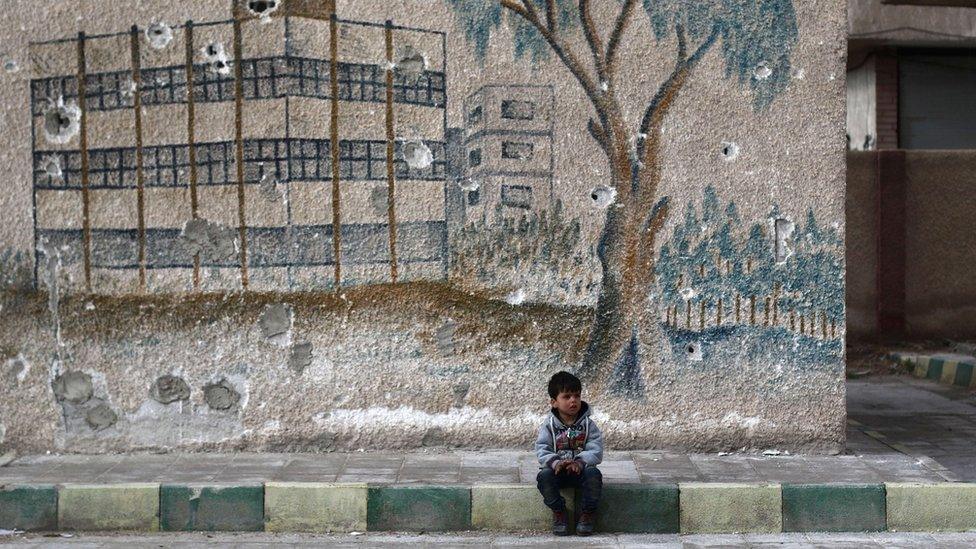
Rebels hold the region of the eastern Ghouta, on the outskirts of the Syrian capital
Opposition activists in Syria have told the BBC that people are dying of starvation in the government-besieged town of Madaya, near Damascus. Reports say residents have resorted to eating grass in two Shia villages further north, Foua and Kefraya, which have been blockaded by rebel forces for even longer.
The United Nations says all parties to the conflict in Syria have used siege warfare, in breach of international human rights and humanitarian laws. International law prohibits the starvation of civilians as a tactic of war.
The World Food Programme and the International Red Cross describe conditions in some areas as "extremely dire".
Here is what we know about the situation for trapped civilians after nearly five years of civil war.

How many people are under siege?
The UN believes that of the 4.5 million people living in what it terms "hard-to-reach" areas of Syria, nearly 400,000 are besieged.
UN Secretary-General Ban Ki-moon's latest report on Syria, external, published in December 2015, notes that "parties to the conflict continued to entirely or heavily restrict access to besieged areas".
Freedom of movement for both people and goods is heavily restricted, leading to high prices for commodities brought in via irregular supply lines.
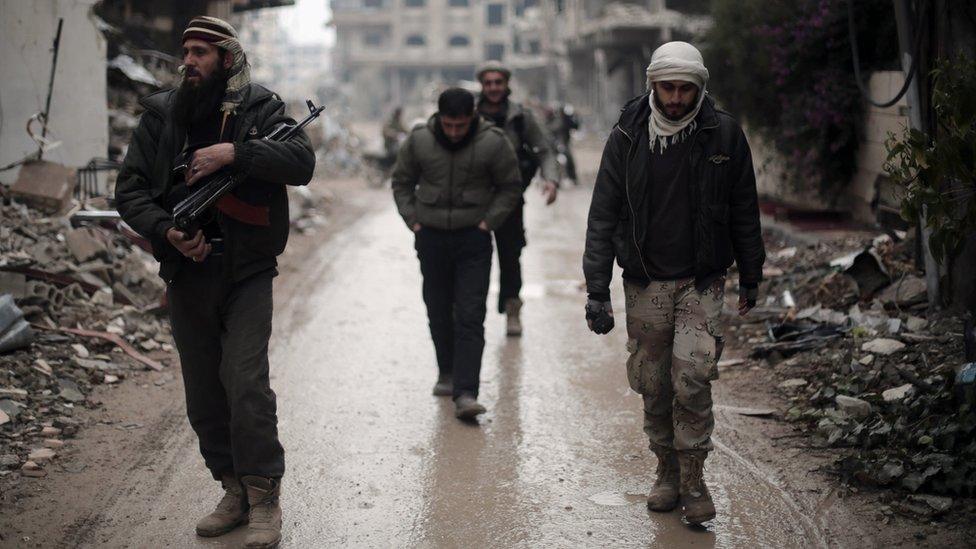
The front lines in Syria - such as here in Jobar in the eastern Ghouta - are fiercely patrolled
The report details the paltry amount of aid that UN agencies were able to provide to those 400,000 people from September to November.
"In September, some 7,800 people were reached with water, sanitation and hygiene assistance in one besieged location. In October, 10,500 people in besieged locations were provided with food, health and basic relief assistance and some 16,700 people were provided with water, sanitation and hygiene assistance. In November, 1,077 children received textbooks and 50 children were provided with winter clothes," it says.
"No other assistance reached the besieged areas in November."
The organisation says only 10% of all requests for its convoys to hard-to-reach and besieged areas in Syria have been granted in the past year.

Which parts of Syria are affected?

According to the UN, those under siege include about 200,000 people in government-controlled areas of the eastern city of Deir al-Zour, which are besieged by Islamic State (IS) militants.
In the eastern Ghouta, a rebel stronghold outside Damascus, about 176,500 people are besieged by Syrian government forces in various locations.
In the suburb of Darayya and mountain town of Zabadani in Damascus Countryside province, about 4,000 and 500 people respectively remain besieged by government forces, the UN says.
Madaya, just to the south of Zabadani, has been under siege since July. The UN says about 42,000 people are trapped there, some of whom fled Zabadani.
In Foua and Kefraya, in Idlib province, some 12,500 people are estimated to be trapped by rebel groups and the al-Qaeda-affiliated al-Nusra Front.

How are people feeding themselves and their families?
With great difficulty. Those civilians trapped inside areas under siege depend on black market supplies at inflated prices.
The UN Human Rights Council's Commission of Inquiry on Syria found in July 2015 that people, particularly the vulnerable, had died of malnutrition and lack of access to medicines and electricity.
"Trapped without basic necessities and under constant fear of deadly snipers or bombardment, severe psychological trauma and desperation characterise the besieged communities," the inquiry found.
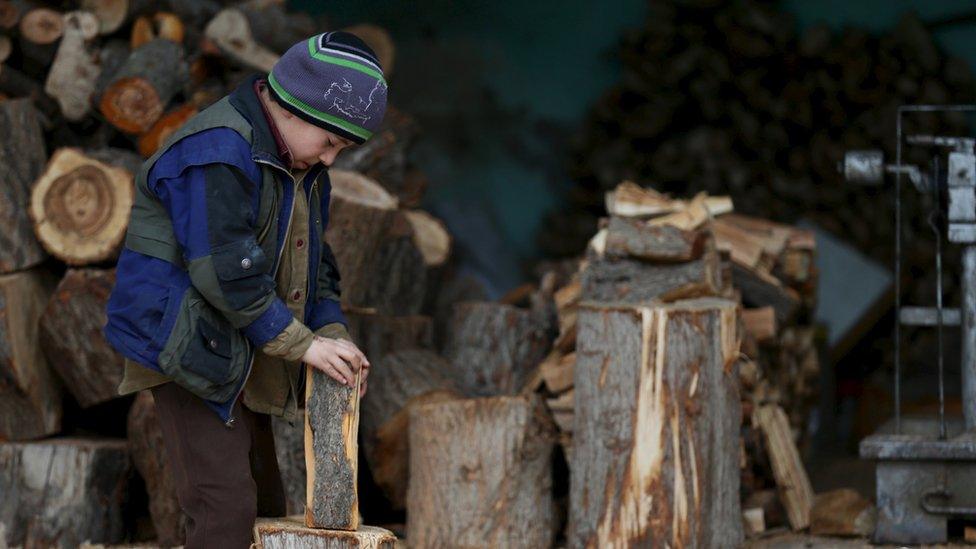
As well as lacking food, people in besieged areas are struggling to keep warm
The commission says that a father drowned in March 2015 when attempting to swim across the River Euphrates from a besieged area of Deir al-Zour to find food for his children.
Snipers in the city have targeted and killed civilians seeking to escape, including children, it says, and in April 2015 a 13-year-old girl died of hunger there.
A resident of Madaya, Abdel Wahab Ahmed, told the BBC on Thursday that two people had died of starvation in the town on one day in January alone.
"People here have started eating earth because there's nothing left to eat," he said. "Grass and leaves have died because of the mounting snow."
He described the lack of medical facilities for the sick and vulnerable as "terrifying".
"Citizens are dying. They're eating stuff off the ground. They're eating cats and dogs," an activist whose family is in Madaya told the BBC on Tuesday.
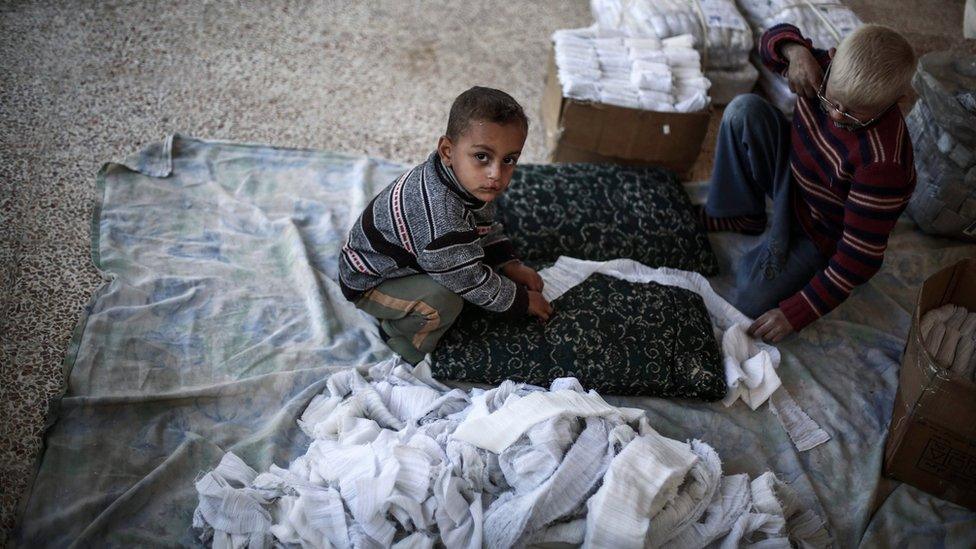
People in besieged rebel-held areas have also had to make their own medical supplies
Pawel Krzysiek, a spokesman for the International Committee of the Red Cross, told the AFP news agency that people had begged him for baby milk when he travelled to Madaya in October (the last time aid reached the town). Mothers were so malnourished they were not producing milk, and there was no way to feed newborns and young babies, he was told.
A local official in Madaya told the Associated Press that the cost of goods had recently soared, with wheat costing about $250 (£170) for a kilogram and powdered milk more than $300.
"Sieges are... a business for those enforcing them and for the most well-connected trapped inside," the UN says.
Government officials and soldiers, and their families, have been less affected by the siege of Deir al-Zour, it reports, as they receive basic supplies via the city's military airport.

Has anyone been evacuated?
A local agreement covering the four besieged towns of Zabadani, Madaya, Foua and Kefraya led to the evacuation of more than 460 people, including some with serious injuries, on 28 December as part of a swap deal.
They were evacuated by land and air through Turkey and Lebanon under the auspices of the UN and the Red Cross and Red Crescent.
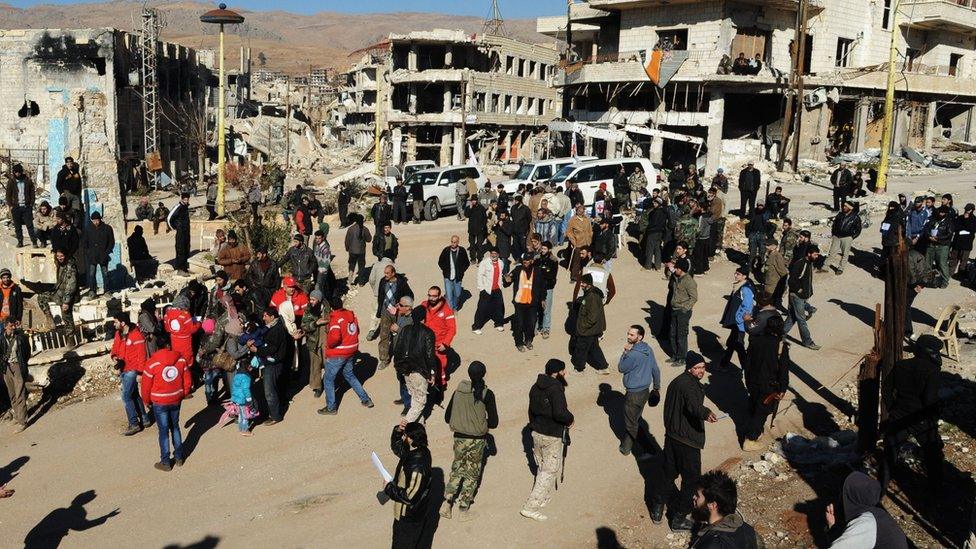
The Red Crescent and other agencies were involved in the evacuation from Zabadani in December
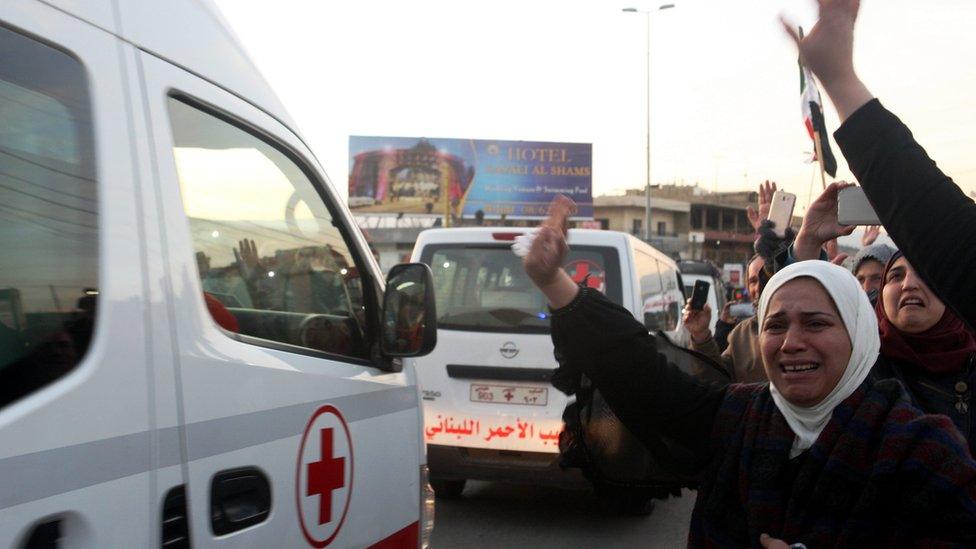
Syrian refugees greeted the convoy of ambulances from Zabadani as it crossed into Lebanon

What can be done to help?
When the deal covering the four towns was first announced in October, the UN's World Food Programme took food rations for 20,000 people to last for a month into besieged Madaya.
Since then, the WFP - and other international agencies - have not been able to get access despite repeated requests to the opposition and the government.
The WFP had thought it would be able to get monthly access to Madaya.
On 7 January the UN said, external the Syrian government had agreed to allow food aid into Madaya, Foah and Kefraya and assistance would be delivered "in the coming days".
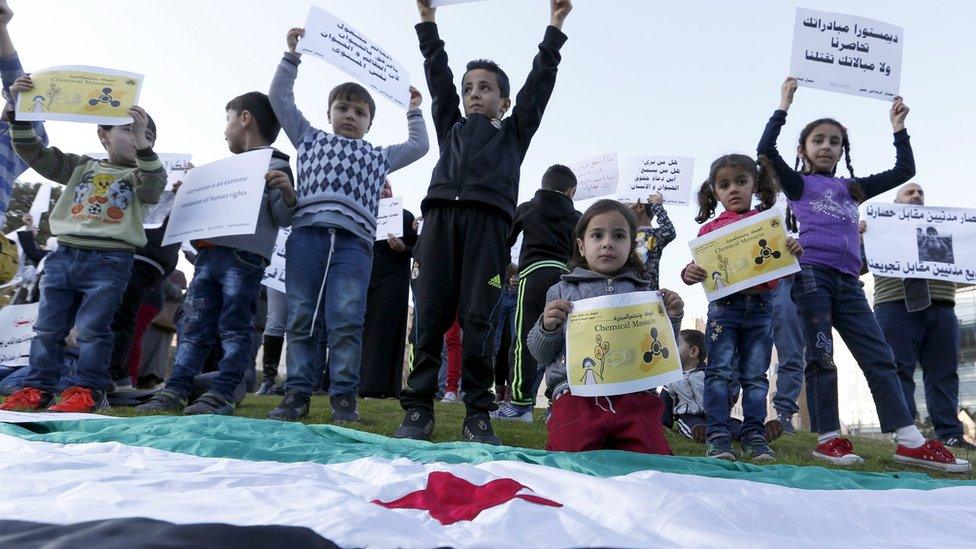
Syrian children in Beirut protest against the siege of Madaya and Zabadani at the UN HQ in Lebanon
Last month's UN Security Council resolution on Syria, external, which endorsed peace talks which are due to start in Geneva at the end of January, calls for immediate access for humanitarian relief to all areas.
Syrian opposition groups are trying to make that, and other goodwill measures, a precondition for attending the conference.
Madaya resident Abdel Wahab Ahmed told the BBC that he wanted people internationally to hold a "day of anger" for his town, adding: "We want solidarity for one day to lift the siege."